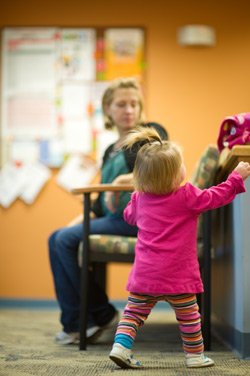One Year Visit
Printable Info Sheet
Important Immunizations

Feeding
After their first birthday, children can start taking whole milk, 24 ounces per day, as well as other dairy products. You may consider weaning the bottle and introducing a cup with a cover.
Increasingly table foods should be offered instead of baby food. Enjoy family meals with your child allowing them to feed themselves. Cut food into small pieces and avoid “choke foods”.
As your baby becomes a toddler, his or her appetite may decrease.
Old data suggested avoiding shellfish, eggs and peanuts and peanut butter may reduce the risk of food allergy. Turns out, food restriction does not reduce the risk of food allergy. Aside from chocking risks and big fish, like shark and tuna, you may feed your child any foods.
Oral Health
Use a toothbrush to clean your baby’s teeth using only water or infant tooth and gum cleaner. Your baby should be getting fluoride, either from your tap water or as a prescription supplement.
Sleep
Children at a year of age are capable of sleeping through the night. Be sure to continue with a night time routine, including putting him or her to bed in their crib awake. Lower the crib mattress to its lowest position.
Night terrors- a sleeping child screams out in the middle of the night while still sleeping- are common at this age.
Safety
Check for hazards at a toddler’s walking level. Reexamine the safety of your home for your toddler, including access to water such as toilets, tubs, pools. Continue to supervise closely. Use sunscreen. Your child should remain in a rear facing car seat until the age of two. Be sure poisons, medicines, matches, weapons are locked up. New Hampshire’s poison control number is 1800 222 1222.
Activities
Allow for exploration and physical activity. Read interactively with your child. Provide opportunities for your child to play by his/herself. Encourage your child to self settle. Limit TV. Give comfort objects such as blankets or stuffed animals.
Behavior
Rules should be limited but consistent. Allow no hitting biting or other aggressive behavior. Use distraction as discipline.
Signs of illness
Signs of illness may include fever, failure to eat, vomiting, diarrhea, irritability, lethargy, rash, or cough. If your child experiences one of these symptoms or you are concerned, feel free to call our office for advice or an appointment.
Developmental Milestones
Verbal: Says 1-2 words
Social: Waves bye, looks for dropped object
Gross motor: Pulls to a stand, furniture surfs or cruises
Fine motor: Uses forefinger and thumb to grasp small objects